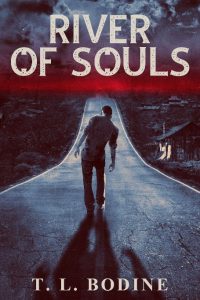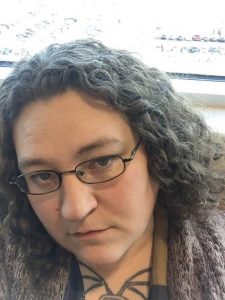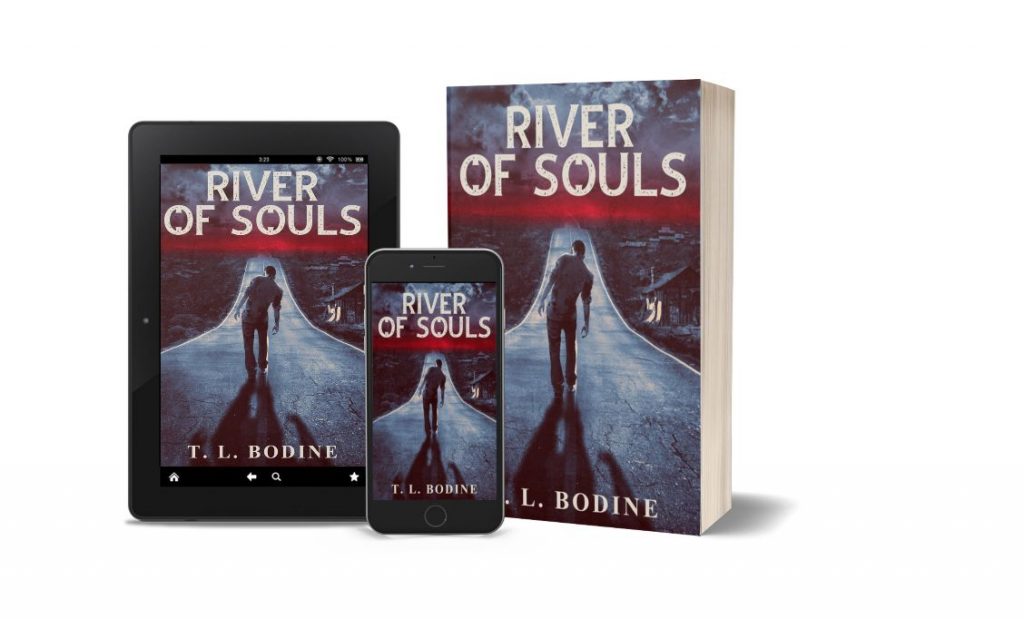T.L. Bodine’s upcoming novel River of Souls (Trepidatio, 2019) puts both new brains and a new heart into the timeworn zombie narrative by creating a world where Undeath is a manageable condition. Manageable, that is, if you’re fortunate enough to afford the constant injections of “miracle drug” Lazarus, willing to register with the government, and don’t step out of line around the living. A coming-of-age story, a sharp social commentary on American treatment of margnizalized communities, and a new take on the zombie yarn, River of Souls releases August 23. In preparation, we talked to author T.L. Bodine about the novel, her influences, and – of course – zombies.
Hellnotes: First off, congratulations on River of Souls! I found it to be a wonderful read with a unique premise and engaging characters, but rather that me drone on, what you can you tell our readers about the novel?
T.L. Bodine: River of Souls is about a community of self-aware zombies who are trying to “pass” for being alive so they don’t lose their rights the way that other Undead do. The main character, Davin Montoya, has struggled for a long time with feelings of resentment and disgust for his Undead father, and he was more than willing to send him to live in a government facility. But after a fatal accident and painful resurrection, Davin has to come to terms with his new identity – while falling into a dangerous underworld and uncovering some dark secrets about the Undead narrative.
It’s a story about found family, blood ties, conspiracies, and more than a little body horror.
HN: Because River of Souls draws a lot of its strength from its narrator gradually finding his way through his changed circumstances, the next part might be difficult, but could you maybe give our readers a brief excerpt? It could be something to whet their appetites, entice them, or just show off your chops.
TLB: Sure! Here’s a little glimpse of a scene you might recognize from the cover.
It’s a long climb back up to the highway, and with every movement I’m half afraid that the effort will wrench my limbs free of their sockets. I imagine leaving pieces of myself behind, body parts working themselves loose until I’m reduced to fragments of meat. But it doesn’t happen, and I pull myself up onto the road and lay for a long time on the shoulder and try to come up with a plan.
I’m a long ways from anywhere. It’s all desert out here, windswept rocks painted the colors of sunsets and scrubby brush that dots the horizon. If I had a car, I’d be maybe half an hour from home. Maybe closer to the casino. I could go inside and ask for help.
But I don’t have a usable car. I’m not even sure I have usable legs.
For the hundredth time, I shove my hands into my pockets, looking for my phone. It’s long gone. It fell out somewhere — in the car, in the river. It doesn’t matter now; it’s not coming back.
I wonder how worried Zoe might be, and that more than anything is what’s driving me forward. It’s just easier not to think about the rest; it’s easier to ignore my mangled body and what this shit means for my future. The worry buzzing on repeat through my skull is all about Zoe.
She’s lost everything already. Mom. Dad. Not me. Not today, if I can help it.
So I heave myself back onto my feet and start walking, because at least that feels like doing something. I don’t know where I’m going (west? the sun seems to be creeping that direction) and I don’t know what I’ll do when I get there, but at least as long as I’m walking I’m not thinking about everything that’s happened.
A truck passes, and the rush of wind shoves me sideways; I sway unsteadily and nearly fall, but the truck is hurtling away without slowing. No one’s going to stop for me, I think. No one’s going to pick up a hitchhiker, not out here. If I’m lucky, they’ll assume that I’m a drunk, and they’ll leave me staggering here on the side of the road to walk it off and find my way home.
If I’m not so lucky…well.
I remember the photograph on Zoe’s monitor, the Undead with his brains splattered across the asphalt. I try, hard, to think about something else.
HN: River of Souls puts the idea of zombies into a fresh context by creating a world where being Undead is a chronic but potentially manageable condition, albeit one that governments and pharmaceutical companies appear willing to exploit for their own ends. Moreover, the idea of unregistered Undead and government crackdowns has some very strong parallels in today’s current political climate. In that regard, River of Souls joins the rich history of adapting zombies for socio-political commentary, so could tell us some of your favorite other examples? Were there any in particular that you referenced when creating your own zombie world?
TLB: The earliest ideas for what would end up being RoS actually started as a straight near-future dystopia, no zombies in sight. The story just wouldn’t come together, though, despite multiple attempts. I had shelved it and had pretty much given up on it when I happened to the film version of Isaac Marion’s Warm Bodies. I got really excited and remember having a breathless phone conversation with my brother (who has heard me rant about plot ideas on numerous occasions) – “Hey, I’ve got it! What if I rewrote the book, but made all of the characters zombies this time!”
He didn’t seem convinced, but I knew I was onto something. So at that point I started hoarding zombie stories, especially zombie protagonist stories like S.G. Browne’s Breathers: A Zombie’s Lament and poring over them for ideas. John Ajvide Lindqvist’s book Handling the Undead and the French TV series The Returned were also big influences.
HN: The Undead in River of Souls are a marginalized community and, given some of the particulars – such as government registration, need for maintenance medications, or facing police brutality – they have resonance with a number of current social groups. What were some of the difficulties and opportunities that using the Undead as stand-ins presented? How did you balance drawing parallels with current social groups while avoiding coding them too closely as any one particular group?
TLB: I tried to approach the idea of the “Undead problem” on its own terms rather than making it a one-to-one allegory for anything in particular. As I was working out the particulars of the world-building, I would try to ask myself how the logistics could work out plausibly. But of course it’s impossible not to draw parallels from real life, and once you’re writing a story about a disenfranchised group you have a sort of moral responsibility to be mindful of the needs of the real-life marginalized people you might be representing (even accidentally). So I guess I tried to cast a very wide net, mixing and matching things.
HN: Although this is your first novel published with Trepidatio, this isn’t your debut. Your Amazon Author Page and Wattpad page show that you have experience with a couple of previously self-published stories and novels. What sort of differences did you find in working with Trepidatio as opposed to self-publishing? What was your self-publishing experience like and would you recommend it to other authors?
TLB: Self-publishing is great because you feel like a bit of a maverick, and there is an undeniable appeal in doing something weird and offbeat with no meddling or influence. But it’s also very lonely. I’m proud of my self-published work, but the experience wasn’t really what I had day-dreamed about as a kid when I thought of being an author, you know? So I sat down one day and made a list of things that I thought were important and that I valued as an author and decided the best way to achieve all of those goals would be to work with a very good small press.
So that’s exactly what I did. Trepidatio/Journalstone was my top choice publisher, and I’ve been extremely satisfied with the experience, from the editing to cover design and promotion work. I’ve found it all very collaborative and hands-on in a way I hadn’t really expected. So I’d consider myself a hybrid author at this point, and I’d really recommend that path to anyone. The modern publishing environment is nothing if not full of options, and you shouldn’t be afraid to explore as many of them as appeal to you.
HN: Without getting into spoilers, the scope of River of Souls is refreshingly controlled. Although the backdrop is a worldwide change, the focus remains very tightly on Davin and his family (biological and ersatz), as they deal with how their circumstances change. What was the impetus behind this focus? Although the larger world is always there as a backdrop and there are some implications for wide-spread change, were you ever tempted to make it into more of a “fate of the world hangs in the balance” story?
TLB: One of my earliest memories is being sent from the room during the evening news so I wouldn’t see the footage of the Gulf War. As I’ve gotten older, that became a sort of trend – seeing the Twin Towers fall on TV, fractious election coverage, mass shootings, terrorist attacks, and all the rest. For me – and maybe this is a Millennial thing – I could never quite escape this odd feeling of living through huge, historical moments that affected my life but never actually touched it.
And that’s an experience I rarely see portrayed in fiction. So I really wanted to tell a story about people trying their best to live their lives and go about their day-to-day personal dramas and private struggles against a backdrop of frightening, even apocalyptic, news coverage. Because that’s sort of been my life experience, and it felt like a story somebody should tell.
HN: Beyond other sources of zombies in popular media, who or what do you view as your creative influences and do you see traces of them in this book? Are there any other creative sources that you consider particularly important in your work, but that readers might be surprised to find out about?
TLB: I’m a huge fan of Kurt Vonnegut. I love his dark humor and his social commentary and the way his language makes storytelling seem so easy. I’m also a big fan of video games and especially story-focused interactive fiction and adventure games. The experience of spooling out a narrative piece by piece for a player to discover and fit together appeals to me a lot, and probably influenced some of my creative choices.
HN: By the end of the novel, the characters have gone through a journey and come to an important realization about the nature of Undeath, but there are a number of open ends. While this gives the book a sense of resonance and resists tying things up too neatly, it also leaves readers wanting more of these characters as they deal with this new paradigm. Do you have any plans to further explore this world or these characters?
TLB: If River of Souls does well, I’d love to continue the story. I’ve got enough material in mind for at least a couple more books in that universe, and there’s plenty of secrets left to uncover. I do hope the ending isn’t too much of a cliffhanger – but I can say that many unanswered questions should be addressed in the next book once it’s finished.
HN: Finally, what’s coming up next for you? In addition to any scheduled releases and events, what sort of ideas are just starting to take shape?
TLB: I’m currently in the process of wrapping up a draft of a book called Ashes, Ashes that is a Wattpad-exclusive, so that’s a good reason to stop by and follow me on Wattpad if you’re not already! It’s about a group of old friends who meet up at a cabin in the woods to give a final send-off to a deceased friend’s ashes, but old grudges and fresh secrets start to surface as mourners begin to die in gruesome ways.
Once that’s wrapped up, most of my focus is going to be on finishing more of the Lazarus books so I can finish Davin’s story arc. After that, well…I guess we’ll see which of the ideas I’ve been stockpiling gets to be the lucky winner. I can promise that, based on the list I keep, I won’t be running out of story ideas any time soon!
T.L. Bodine spent her childhood in a motorhome, living with her blue-collar family in a number of America’s forgotten small towns. These days she’s settled in the Albuquerque, NM area where she writes dark stories about the intersection of the creepy and the mundane. Her novel The Hound was a winner in the internet’s largest writing contest, The Watty Awards, in 2018. When not writing, she can be found playing story-heavy video games and occasionally experimenting in the kitchen.
Facebook: https://www.facebook.com/glassratmedia/
Twitter: https://twitter.com/glassratmedia
Blog: http://tlbodine.blogspot.com/
Tumblr: https://tlbodine.tumblr.com/
Pre-Order River of Souls now on B&N: https://www.barnesandnoble.com/w/river-of-souls-t-l-bodine/1131956124
Or on Amazon: https://www.amazon.com/River-Souls-T-L-Bodine/dp/1950305015
Or from the publisher: http://journalstone.com/bookstore/river-of-souls
Or add it to your Goodreads library: https://www.goodreads.com/book/show/46183381-river-of-souls











